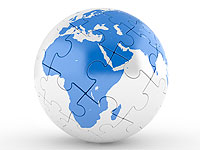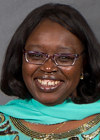 The International Education Association of South Africa (IEASA) in January hosted a historic global dialogue on the challenges related to internationalization of higher education and the responsibility of international education associations in advancing balanced, equitable, just, and mutually beneficial internationalization practices.
The International Education Association of South Africa (IEASA) in January hosted a historic global dialogue on the challenges related to internationalization of higher education and the responsibility of international education associations in advancing balanced, equitable, just, and mutually beneficial internationalization practices.
The forum was held in Port Elizabeth, South Africa, a location of great symbolic significance, and brought together 24 international education organizations from across the world, including representatives from North America, Europe, Asia Pacific, Middle East, Africa, and South America. NAFSA was among the associations present. The dialogue was the most inclusive yet; still, major voices such as India, China, and others, for various reasons, were not present.
Dr. Lavern Samuels, president of IEASA, best captured the critical challenges we face as international educators with his opening statement:
"It is our opportunity to reflect on our practices of our past and the present and to envision a future that harnesses the potent potential that has internationalisation as a transformative tool, which has impacts not only within higher education but more profoundly on broader society, thereby bringing about change to the world we live in….
We have significant challenges in moving towards a framework for the internationalisation of higher education that is more inclusive and more impactful.
- How do we move beyond narrow parochial interests and immigration policies that currently inhibit the potential that internationalisation has to create a better world?
- How do we bridge the North-South divide in a manner that is mutually beneficial?
- How do we sustain the diversity of voices in the ongoing internationalisation dialogues? …There is an African proverb that says 'For as long as the lion does not have a storyteller, the story of the hunt will always glorify the hunter.'
- How do we reshape higher education internationalisation and the internationalisation development agenda so that it more effectively addresses world issues and participates in finding collective solutions to global challenges, e.g.: epidemic diseases, food security, sustainable development, reusable energy, and peace and security?
- How do we ensure that the impact and benefits of internationalisation are felt by not only by the mobile minority but by all our graduates and staff and then beyond.
- And, perhaps for me, mostly important to build on individual benefits of internationalisation and take it to a level that builds a better world and ensures that we have a sense of global citizenship in a world that is more tolerant, peaceful, mutual, respectful. And certainly the one that addresses the huge disparity in the one we see today."
The issues of inequities in international education are not new, and the recognition that those involved in international education must do more to address imbalances in student flow, strengthen the curriculum, and ensure that those who are socioeconomically disadvantaged be afforded equal access to an education fit for the 21 st century—meaning one that takes into account multiple perspectives and voices—has been an ongoing debate. What is new is the fact that this dialogue was initiated and hosted by our colleagues from the South—specifically South Africa—and the fact that new voices that had not participated in previous dialogues, including the Association of Arab Universities (AARU), Association of Brazilian Higher Education Institutions Offices of International Relations (FAUBAI), and Inter-University Council for East Africa (IUC-East Africa), were involved.
One of the principal objectives of the dialogue was to engage in "in-depth discussion about the power relationships that currently drive the world of higher education internationalization." Dialogue participants readily acknowledged the power relations inherent in the world of higher education internationalization and the absence of voices from the global south in determining internationalization frameworks. The notion of a "gated world" was advanced to describe the myriad of ways that exclusion takes place.
The two-day dialogue focused on the need for a level playing field. Participants recognized the challenges in bringing major stakeholders to the table and vowed to redouble their efforts. At the end of two days of intense discussions, the education groups agreed on the "Nelson Mandela Bay Global Dialogue Declaration on the Future of Internationalisation of Higher Education" and declared their "commitment to emphasise the importance of decision-making and practices in the development of internationalisation activities that are imbued by ethical considerations of inclusivity."
The group emphasized "that internationalisation must be based on mutual benefit and development for entities and individuals in the developed, emerging, and developing countries." Participating international education organizations "commit themselves to promote international higher education and research that recognises the richness and diversity offered by all regions for a global higher education agenda which is equitable, ethical, socially responsible, accessible and accountable."
Participants agreed that the future agenda for internationalization should in particular focus on the three integrated areas of development:
- Enhancing aspects of quality and diversity in programs involving the mobility of students and academic and administrative staff.
- Increasing focus on the internationalization of the curriculum and of related learning outcomes.
- Gaining commitment on a global basis for the creation of equal and ethical higher education partnerships.
The declaration outlines key priority actions. It is clear that the foci outlined in the declaration align with NAFSA's new strategic plan. I call upon our members to ensure that efforts to advance comprehensive internationalization are inclusive, mutually beneficial, responsible, and responsive. Furthermore, it is critical that as international educators we remain intentional in recognizing the absence of important voices in the internationalization debate and be willing to take appropriate actions to remedy such shortcomings. Given the interdependent world in which we live and work, internationalization framework absent accountability for greater inclusion is likely to fail in advancing positive societal change and further exacerbate the global divide.
NAFSA Contributions to the Global Dialogue
NAFSA plans to do its part in addressing inequities in international education through its strategic plan. We are cognizant that much more needs to be done and we call on members and international education partners to join us. Below are a few highlights of our current efforts:
1) NAFSA's 2014-2016 Strategic Plan
The Board of Directors with the input of member-leaders created a new strategic plan that sets a new aggressive agenda to achieve an even more positive internationalization impact. The plan expresses clearly our values, mission, and strategic direction.
2) NAFSA's Impact Scholarships
To expand opportunities for institutions within the United States that may not traditionally have been as engaged in internationalization efforts, NAFSA in 2013 launched an initiative aimed at increasing the presence of nontraditional institutions at the annual conference through Impact Scholarships.
These awards, designed to help underrepresented institutions build their capacities to internationalize the curriculum and further global competence on campus, provide complimentary registration to the NAFSA Annual Conference & Expo for first-time attendees from community colleges and associate colleges, Historically Black Colleges and Universities (HBCUs), Hispanic-serving Institutions (HSIs), and tribal colleges and universities.
3) 100,000 Strong in the Americas Partnership
In collaboration with the U.S. Department of State and Partners of the Americas (a leading voluntary and development agency with more than 45 years of experience in the Americas), NAFSA is working to forge public-private partnerships so that universities and colleges can expand study abroad programs and make international study more broadly available.
4) NAFSA 2014 Annual Conference
Among the many opportunities taking place at NAFSA's 2014 Annual Conference in San Diego in May, we especially look forward to:
- Kakenya Ntaiya, founder of the Kakenya Center for Excellence, the first primary school for girls in Enoosean, Kenya, is the Thursday plenary speaker.
- Albie Sachs, a freedom fighter against Apartheid, who was appointed by Nelson Mandela to the Constitutional Court of South Africa, is the Friday closing plenary speaker.
- Higher Education in South Africa 20 Years into Democracy (May 30). Dr. Lavern Samuels will chair this session, which will reflect on the development, transformation, and internationalization of the South African higher education system since the first democratic elections in 1994.
- Key Developments, Challenges, and Opportunities in African Higher Education (May 29) Narciso Matos, executive director of the Foundation for Community Development (FDC) in Mozambique, will explore key trends and promising developments related to higher education in Africa.
- International Higher Education and International Development: Bridging the Gap (May 30) Panelists will examine the existing disconnect between international higher education and international development, and the role that mobility, partnerships, and other forms of international engagement can and should play in the global development agenda.
5) Ron Moffatt Seminar on Peace and Global Civil Society
The NAFSA Ron Moffatt Seminar honors the memory of a NAFSA past president who was deeply committed to strengthening the connections between international education and the building of a global civil society. The seminar will bring together thought leaders and practitioners in peace building, reconciliation, and conflict resolution, and educators focused on teaching and facilitating transnational education, to explore how educators can help students find their place in and develop a commitment to a global civil society.
6) Internationalization of the Curriculum
NAFSA's programs and resources on internationalizing key disciplines, including colloquia on teacher education, legal education, business education, STEM fields, education for the health professions, and general education, serve as a catalyst for transforming the curriculum and building communities of practice among faculty members, deans, and related international educators.
These are just a few highlights of our commitments to leveling the playing field and advancing an international education agenda predicated on social responsibility, equity, and a shared future. We welcome feedback and ideas related to productively accelerating efforts and we look forward to collaborating with international education associations around the world in the call for action.
 Fanta Aw, PhD, is assistant vice president of campus life at American University. Aw advises university senior leadership on campus internationalization, and on matters of diversity and inclusion. She received her MA in public administration with a focus on organizational development and her PhD in sociology from American University.
Fanta Aw, PhD, is assistant vice president of campus life at American University. Aw advises university senior leadership on campus internationalization, and on matters of diversity and inclusion. She received her MA in public administration with a focus on organizational development and her PhD in sociology from American University.
Her areas of specialization include transnational migration, international education, and intercultural communication. Aw joined the NAFSA Board of Directors in 2009 and became president and chair in 2013.
